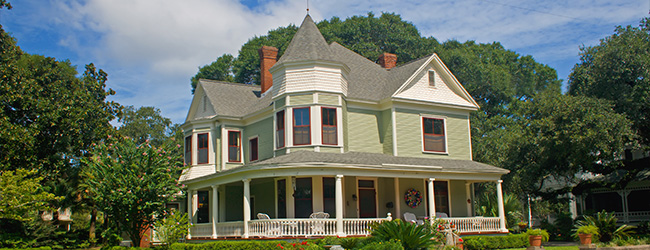
Make History Yours! What You Should Know About Buying Historic Property
They’re classic, romantic, treasured and revered. They’ve withstood war, weather and even the worst of economic conditions. So, it is no wonder why many people in today’s real estate market naturally are drawn to historic properties. If you fall into that enamored group, you even may have considered finding a historic property to call your own. When you’re looking for a vintage home, there are a few things you need to know before deciding to make your sale… well, history. Now, if you’re new to the real estate market and you consider a “vintage” home to be one that was built before 2000, you may have a lot to learn. All joking aside, a historic home is one that either the National Register of Historic Places or a local historical board or society has deemed architecturally significant. A historic property embodies an architectural style or captures the essence of a specific historical time period. Because of those historical attributes, vintage properties often are protected by specific laws that govern their maintenance, remodeling and overall care. While the rules that surround each historic property differ, there are a few generally-followed guidelines: While the guidelines that govern the care of historic homes may seem difficult and are sometimes costly, there are various benefits to owning a historic home: 1. At the federal level, the National Park Service offers a 20% kickback for renovations on any home designated a historic property. Even if the historic home that you are considering has not been designed as a historic property, there is a federal tax break for businesses that exist inside of homes built before 1936. Historic home owners also can receive a generous tax break by donating a portion of their property to a historical preservation organization. As charitable donations go up, property value decreases, also decreasing property taxes. 2. On the state level, there are over 30 states that offer tax credits for renovating historic properties. This credit is in addition to the federal credit and state guidelines are usually less strict than federal guidelines. Many states also have programs to reduce the property taxes that are levied on owners of historic buildings. 3. There are often easements in existence between historic home owners and representatives from local historical preservation societies. These agreements hold benefits like reduced income taxes, estate taxes or property taxes. Local historical preservation offices may also be able to help historic home owners put a freeze on property tax increases. 4. Finally, on all levels, there are many grant opportunities that exist for historic home owners. If you’re interested in seeing what may be available in your area, a real estate agent with experience in historic home sales should be able to point you in the right direction. For certain, there is a good deal of effort and much gratification that go hand in hand when it comes to owning a historic property. Before you buy a vintage property, it is a good idea to get a few cost estimates from a trusted contractor on any work that you foresee putting in to a historic home. You also should take a long look at the taxes, utility bills and insurance that can accompany the historic home you are considering. It is important to understand what future bills may look like before you sign on the dotted line. Finally, a home inspection, completed by either an inspector who specializes in older homes or a structural engineer, is a MUST. You don’t want to find structural problems or other hidden issues after closing. You also want to make sure the historic home meets all of today’s health and safety standards before you decide to move in and make it your own. If you are interested in seeing some historic properties, contact an experienced real estate agent from Berkshire Hathaway HomeServices The Preferred Realty today.





